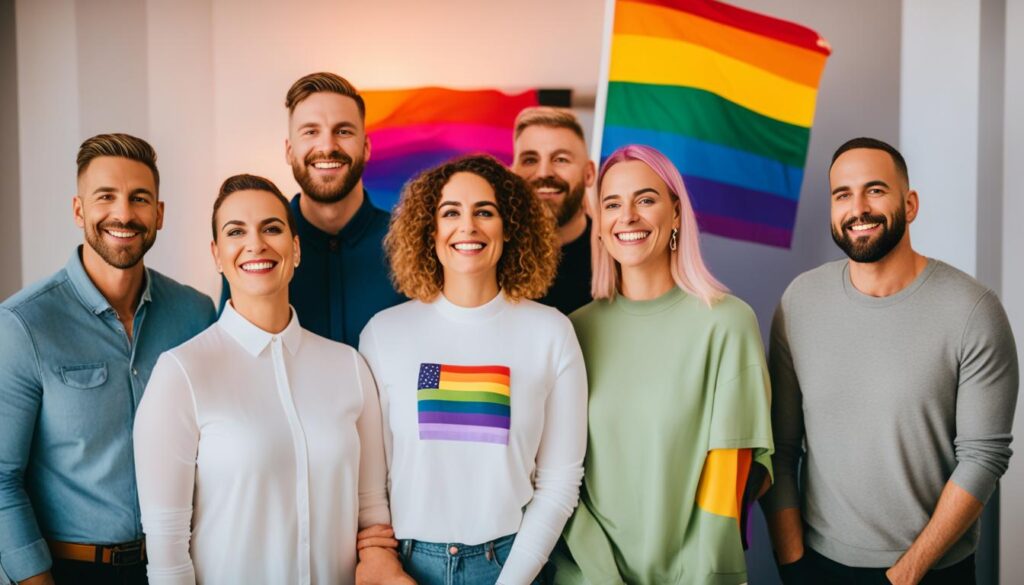“Do not dwell in the past, do not dream of the future, concentrate the mind on the present moment.” – Buddha
Questioning one’s sexuality can be a complex and deeply personal experience. It’s a journey of self-discovery that may bring up a wide range of emotions and uncertainties. While navigating this path can feel overwhelming at times, it is also an opportunity for growth, understanding, and self-acceptance.
In this article, we aim to provide guidance and encouragement for individuals who find themselves questioning their sexuality, even when they identify as straight. We will explore practical steps that can help you navigate through this process of self-exploration and shed light on your true identity.
Key Takeaways:
- Questioning one’s sexuality is a normal part of self-discovery.
- Reflect on your feelings and desires to gain clarity.
- Educate yourself on different sexual orientations and gender identities.
- Build a supportive network of trusted individuals or LGBTQ+ support groups.
- Consider seeking professional guidance for additional support.
Reflecting on Feelings and Desires
When questioning your sexuality, it’s essential to take time to reflect on your feelings, attractions, and experiences. This process involves exploring your emotions, journaling, and being open-minded and non-judgmental.
By allowing yourself to delve into your thoughts and desires, you can gain clarity and insights into your own feelings. Understanding your own emotions and attractions is a crucial step in the process of self-discovery.
Reflecting on your feelings can be a deeply personal and transformative experience. It allows you to explore the nuances of your sexuality, acknowledge any patterns or inconsistencies, and gain a better understanding of who you are.
Talking to trusted friends about your feelings and experiences can also be helpful in this reflection process. They can provide support, empathy, and different perspectives that may shed light on your own journey.
Journaling, whether in a notebook or on a digital platform, can be a powerful tool in understanding your emotions, attractions, and experiences. By putting your thoughts into words, you can gain clarity, identify patterns, and track your personal growth over time.
If you find yourself struggling to make sense of your feelings or desires, seeking professional guidance from therapists, counselors, or psychologists who specialize in sexuality can provide invaluable support. They can help navigate through complex emotions, provide coping strategies, and offer a safe space for self-exploration.
Remember, the journey of self-discovery is unique to each individual. Take the time and space you need to reflect on your feelings and desires, and embrace the process with patience and self-compassion.

Exploring Emotions and Desires
- Reflect on your feelings and attractions.
- Be open-minded and non-judgmental.
- Journal to gain insights and clarity.
- Talk to trusted friends about your experiences.
- Consider seeking professional guidance when needed.
Educating Yourself on Sexual Orientations
When questioning your sexuality, it’s important to educate yourself about different sexual orientations and gender identities. By familiarizing yourself with the LGBTQ+ community, reading personal stories, and seeking reliable resources, you can gain a better understanding of the spectrum of human sexuality. This knowledge serves as a foundation for self-discovery and can provide valuable insights that may resonate with your own experiences.
Understanding the LGBTQ+ Community
To educate yourself on sexual orientations and gender identities, it’s essential to understand the LGBTQ+ community. The LGBTQ+ community encompasses individuals who identify as lesbian, gay, bisexual, transgender, queer, and more. By learning about the diverse identities within this community, you can broaden your perspectives and develop empathy and support for others.
Reliable Resources for Self-Education
Seek out reliable resources that provide accurate and comprehensive information on sexual orientations and gender identities. Reputable organizations and websites such as GLAAD, Human Rights Campaign, and The Trevor Project offer educational materials, personal narratives, and guides to help you navigate and understand the LGBTQ+ community.
| Resource | Description |
|---|---|
| GLAAD | An LGBTQ+ organization that promotes understanding, acceptance, and equality through media advocacy and education. |
| Human Rights Campaign | The largest LGBTQ+ civil rights organization in the United States, working towards equality and advocating for LGBTQ+ rights. |
| The Trevor Project | A leading organization focused on crisis intervention and suicide prevention among LGBTQ+ youth, providing resources and support. |
Note: This table provides a sample of reliable resources. There are many other organizations and websites available that offer valuable information.
By utilizing these resources, you can gain knowledge and understanding, allowing you to navigate the complexities of sexual orientation and gender identity. Educating yourself is an empowering step in your self-discovery journey.

Building a Support Network
When navigating your sexuality journey, it’s crucial to have a strong support network that understands and respects your unique experience. Surrounding yourself with trusted friends, supportive individuals, and engaging with LGBTQ+ support groups can provide the guidance and validation you need along your path of self-discovery.
Friends and family members who are accepting and empathetic can play a crucial role in your journey. Share your feelings and concerns with them, allowing them to offer their support and understanding. Hearing different perspectives and receiving unconditional love from your loved ones can help you navigate through the challenges you may encounter.
If you’re looking for a more extensive support network, consider connecting with LGBTQ+ support groups. These groups provide safe spaces where you can openly explore your identity, ask questions, and find solace and guidance amongst individuals who share similar experiences. Attending local events, joining online forums, or participating in LGBTQ+ organizations and advocacy work can strengthen your ties to the community and offer opportunities for growth.

Engaging with LGBTQ+ support groups not only surrounds you with understanding individuals who are walking similar paths, but it also provides access to a wealth of resources and information. Through support groups, you can gain insights, learn coping mechanisms, and find guidance from experienced mentors who can help you navigate your journey with compassion and wisdom.
Remember, building a support network is an ongoing process. It may take time to find the right individuals and groups that resonate with you. Be patient with yourself and don’t hesitate to reach out. You are not alone in your journey, and there are people ready to support and uplift you every step of the way.
Seeking Professional Guidance
If you find yourself struggling to make sense of your feelings or experiencing distress, seeking professional guidance can be beneficial. LGBTQ+ therapists, counselors, or psychologists who specialize in sexual orientation and identity can provide you with the necessary tools to navigate your journey. They offer a safe and non-judgmental space for self-exploration and can help you develop coping strategies. Seeking professional guidance is a valuable step towards understanding and accepting your sexuality.

Why Seek Professional Guidance?
Questioning your sexual orientation and identity can be complex, and it’s common to experience confusion and conflicting emotions. LGBTQ+ therapists, counselors, and psychologists have the expertise and knowledge to support you through this process. They can help you gain clarity, explore your feelings in a supportive environment, and provide valuable coping strategies.
Creating a Safe Space
One of the key benefits of seeking professional guidance is accessing a safe and non-judgmental space to explore your identity. LGBTQ+ therapists are trained to understand the unique challenges and experiences that individuals questioning their sexuality may face. They will provide a compassionate and empathetic environment where you can freely express your thoughts and emotions without fear of discrimination or misunderstanding.
Specialized Expertise
LGBTQ+ therapists, counselors, and psychologists have specialized training and knowledge in the area of sexual orientation and identity. They stay up to date with research and advancements in LGBTQ+ healthcare, ensuring that you receive the most relevant and effective support. Their expertise allows them to provide tailored guidance and strategies specifically designed to address your individual needs.
Coping Strategies
Questioning your sexuality can bring about a range of emotions and challenges. LGBTQ+ therapists, counselors, and psychologists can help you develop coping strategies to manage these difficulties effectively. They can provide you with tools and techniques to navigate through uncertainty, anxiety, and any other emotions that may arise during your self-discovery journey.
Professional Network
LGBTQ+ therapists and counselors often have connections with other professionals and resources within the LGBTQ+ community. They can provide you with referrals to support groups, community organizations, and other relevant services. Building a network of support and connecting with others who have similar experiences can enhance your journey of self-discovery and provide a sense of belonging.
Take the First Step
If you’re feeling overwhelmed or uncertain about your sexual orientation, seeking professional guidance is a proactive step towards self-understanding and acceptance. LGBTQ+ therapists, counselors, and psychologists are there to support you and guide you on your unique journey. Remember, you don’t have to navigate this alone.
Embracing Self-Acceptance
Self-acceptance is an essential aspect of your journey towards understanding your sexuality. It’s about embracing and celebrating your authentic self, with all its complexities and nuances. By accepting yourself, you create a foundation for personal growth and transformation.
Self-acceptance is not always easy and may take time. It’s okay to go at your own pace and honor your unique process. Give yourself permission to explore and evolve, knowing that change is a natural part of personal growth.
To cultivate self-acceptance, surround yourself with positivity. Eliminate self-criticism and replace it with self-compassion. Speak kindly to yourself, acknowledging your strengths and embracing your flaws. Practice self-care to nourish your mind, body, and soul, allowing yourself to thrive.
Developing a positive mindset is crucial on this journey. Challenge negative thoughts and replace them with affirmations that empower you and validate your experiences. Remember that your sexuality is valid, beautiful, and worthy of acceptance.
A journey of self-acceptance is not meant to be traveled alone. Seek support from trusted friends, family members, or LGBTQ+ support groups. Engage with individuals who will uplift and affirm you, creating a safe space for you to embrace your true self.
Practicing Compassion
Compassion plays a vital role in self-acceptance. Treat yourself with the same kindness, understanding, and empathy you would offer to a loved one. Embrace your feelings and experiences with non-judgment and self-compassion. Allow yourself to make mistakes, learn from them, and grow.
Remember, self-acceptance is a lifelong process, and it may have its ups and downs. Embrace the journey, remaining open to new discoveries and experiences. Each step you take towards self-acceptance brings you closer to a deeper sense of fulfillment and understanding of your sexuality.
| Benefits of Self-Acceptance | How to Cultivate Self-Acceptance |
|---|---|
|
|
Embracing the Journey of Self-Discovery
Questioning your sexuality is a profound and transformative process. It’s a unique journey of self-discovery that requires time, patience, and self-compassion. Allow yourself to explore your feelings and thoughts without the pressure to find immediate answers. Remember, uncertainty is natural, and your journey is personal to you.
Trusting in your instincts and giving yourself the space to evolve and grow over time is key. Embracing the journey of self-discovery means continuously learning, understanding, and accepting your sexuality as it unfolds.
Embrace Self-Reflection and Growth
Self-reflection plays a vital role in the process of self-discovery. Take the time to reflect on your experiences, emotions, and desires. Journaling can be a powerful tool to capture your thoughts and gain clarity. Explore your attractions and discover what resonates with your authentic self.
Remember, personal growth is an integral part of this journey. Allow yourself to evolve, challenge societal norms, and let go of any assumptions or expectations placed upon you.
Find Support and Connection
Building a support network is crucial during your journey of self-discovery. Seek out trusted friends, family members, or LGBTQ+ support groups who can provide a safe and understanding space. Connecting with others who have similar experiences can offer validation and reassurance.
Consider engaging with local LGBTQ+ events, online communities, or advocacy organizations to foster connections and enhance your support system. Remember, you are not alone in this journey.
Seek Professional Guidance
If you find yourself struggling or feeling overwhelmed, seeking professional guidance can be incredibly beneficial. LGBTQ+ therapists, counselors, or psychologists are well-equipped to provide the support and tools you need.
These professionals specialize in sexual orientation and identity and can provide valuable insights, coping strategies, and a safe, non-judgmental space for exploration. Remember, reaching out for help is a sign of strength.
Educate Yourself and Embrace Growth
Education is a powerful tool in self-discovery. Take the time to educate yourself about different sexual orientations, gender identities, and the LGBTQ+ community. Seek reliable resources, read personal stories, and gain a deeper understanding of the diverse experiences of others.
By expanding your knowledge, you can gain valuable insights and find connections that resonate with your own journey. Embrace the opportunity to challenge preconceived notions and foster personal growth.
Visual representation of the self-discovery journey:
| Milestone | Description |
|---|---|
| Awareness | Recognizing and acknowledging the need for self-discovery and personal growth. |
| Exploration | Delving into emotions, attractions, and experiences to gain insight and understanding. |
| Uncertainty | Accepting that uncertainty is a normal and necessary part of the journey. |
| Self-reflection | Engaging in introspection and journaling to gain clarity and explore personal desires. |
| Growth | Embracing personal growth, challenging societal norms, and letting go of expectations. |
| Support | Building a support network of trusted friends, family, and LGBTQ+ communities. |
| Professional guidance | Seeking the help of LGBTQ+ therapists, counselors, or psychologists for support and guidance. |
| Educate and Empower | Continuing to educate oneself, embracing growth, and challenging societal norms. |
| Self-Acceptance | Finding acceptance and love for oneself, celebrating personal authenticity. |
Remember, every step of your self-discovery journey is valid and meaningful. Embrace the process, trust yourself, and allow your true self to flourish. As you navigate this unique path, you will continue to evolve and grow, ultimately finding a deeper understanding and acceptance of your sexuality.
Conclusion
Questioning your sexuality can be a transformative journey of self-discovery, filled with challenges and moments of liberation. It’s crucial to approach this journey with compassion, patience, and the support of others. Remember, you are not alone.
Reflecting on your feelings, educating yourself, and building a support network are key steps in navigating this process. Take the time to explore your emotions and desires, seeking clarity through self-reflection and open-mindedness. Educate yourself about the diverse identities and experiences within the LGBTQ+ community, allowing knowledge to be a foundation for self-discovery.
Building a support network of trusted friends, family, or LGBTQ+ support groups will provide you with the acceptance and understanding you need. Seeking professional guidance from LGBTQ+ therapists or counselors who specialize in sexual orientation and identity can also be valuable. Remember, self-acceptance is an ongoing journey. Embrace yourself with love and compassion, surrounding yourself with positivity as you grow and evolve.
Your journey of self-discovery is valid, and the LGBTQ+ community is a source of acceptance, diversity, and support. By embracing your authentic self, you can find acceptance, love, and respect within yourself and within the LGBTQ+ community. Trust in your own instincts and know that you have the strength to navigate this path of self-discovery and live life authentically.
FAQ
Why am I questioning my sexuality when I know I’m straight?
Questioning your sexuality is a natural part of self-discovery, regardless of your presumed sexual orientation. It’s essential to give yourself the space to explore and understand your feelings without judgment.
How do I understand my sexual orientation if I’m straight but questioning?
Reflecting on your feelings and experiences, educating yourself about different sexual orientations, and seeking support can help you gain a deeper understanding of your sexual orientation, even if you identify as straight.
How can I explore my emotions, attractions, and experiences when questioning my sexuality?
Taking the time to reflect through journaling, seeking supportive conversations with trusted friends, or working with a professional can help you delve into your thoughts and desires, gaining clarity and insights into your own feelings.
How can I educate myself about sexual orientations and gender identities?
Read personal stories, familiarize yourself with the LGBTQ+ community, and seek reliable resources to expand your knowledge and gain a better understanding of the spectrum of human sexuality.
How can I build a support network when questioning my sexuality?
Seek out LGBTQ+ support groups, engage with trusted friends and supportive individuals, and connect with the LGBTQ+ community through local events or online forums to find a safe and accepting space for your journey.
Should I seek professional guidance when questioning my sexuality?
If you find yourself struggling to make sense of your feelings or experiencing distress, seeking support from LGBTQ+ therapists, counselors, or psychologists who specialize in sexual orientation and identity can provide the necessary tools to navigate your journey.
How can I embrace self-acceptance when questioning my sexuality?
Embrace and celebrate your authentic self, practice self-care, and cultivate a compassionate and accepting relationship with yourself. Acceptance takes time, so be patient and go at your own pace.
How long does the journey of self-discovery when questioning sexuality take?
The journey of self-discovery is unique to each individual and can’t be rushed. Give yourself time to explore your thoughts and feelings without feeling pressured to find immediate answers. Trust in your own instincts and allow yourself to evolve and grow over time.
Will I find acceptance in the LGBTQ+ community during my journey of self-discovery?
Yes, the LGBTQ+ community is a source of acceptance, diversity, and support. By embracing your authentic self, you can find acceptance, love, and respect within yourself and within the LGBTQ+ community.

